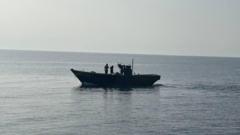South Korea has completed the repatriation of six North Koreans who had inadvertently crossed into its waters during a difficult period for inter-Korean relations. The individuals, comprising two who entered in March and four sailors who drifted in May, had consistently expressed the desire to return home, according to South Korea's Ministry of Unification. This marks the first official return under President Lee Jae-myung's administration, which had promised to enhance ties with the North.
Historically, such returns were managed via coordination between the two governments, but for the past months, direct communication has been severed. Following tensions and North Korea’s decision to cut lines in April 2023, attempts by Seoul to discuss the repatriation through the United Nations did not yield a response, raising questions about underlying agreements between the two nations.
Experts suggest that the repatriated North Koreans will likely face intense scrutiny from Pyongyang, seeking information potentially obtained during their time in the South. Claims indicate that coerced cooperation may further bolster Kim Jong Un's governance claims. Observers note that the broader political climate surrounding the interim leadership during these incidents may have complicated the repatriation process.
The news has evoked mixed reactions from defectors in the South, with activists expressing disappointment that these individuals were not afforded the opportunity to learn about life in South Korea and potentially share valuable insights. The visible opposition to such exchanges aligns with ongoing discourse within South Korea regarding engagement strategies with the North, particularly under the current presidential administration.
Despite assurances of dialogue and de-escalation from President Lee, analysts remain skeptical about real improvements in relations. The enduring collaboration between North Korea and Russia, coupled with low public interest in engagement within South Korea, presents significant barriers to developing a constructive diplomatic environment. As diplomatic avenues narrowing, the inter-Korean dynamic remains fraught with challenges that hinder prospects for peace on the peninsula.

















